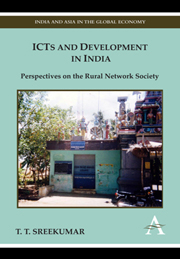Book contents
- Frontmatter
- Contents
- List of Figures and Tables
- Preface
- 1 Introduction: Exploring the Rural Network Society
- 2 Civil Society and Cyber–Libertarian Developmentalism
- 3 Decrypting E-Governance
- 4 Cyber-Kiosks and Dilemmas of Social Inclusion
- 5 Innovating for the Rural Network Society
- 6 ICT and Development: Critical Issues
- Notes
- Bibliography
- Index
2 - Civil Society and Cyber–Libertarian Developmentalism
Published online by Cambridge University Press: 05 March 2012
- Frontmatter
- Contents
- List of Figures and Tables
- Preface
- 1 Introduction: Exploring the Rural Network Society
- 2 Civil Society and Cyber–Libertarian Developmentalism
- 3 Decrypting E-Governance
- 4 Cyber-Kiosks and Dilemmas of Social Inclusion
- 5 Innovating for the Rural Network Society
- 6 ICT and Development: Critical Issues
- Notes
- Bibliography
- Index
Summary
The Cyber–Libertarian Turn
The convergence of development rhetoric and information society theories in discourses on the digital divide and informational capitalism marks a cyberlibertarian turn in development studies. While critiquing the tendency to conflate civil society and information society, Sparks (1994, 39) draws attention to the emergence of a widely held deterministic position that the increases in productivity brought about by Information and Communication Technologies (ICTs) would lead to a progressive weakening of power structures that formed the basis of social organization under industrial capitalism. Sparks particularly highlights the approach of ‘new times’ theorists of the now defunct magazine Marxism Today for advancing the argument that communication technologies can ‘undermine strong power pyramids more directly’ (Sparks 1994, 38). This approach largely ignores the deep contradictions of informational capitalism characterized by increasing income inequalities, reinforcing development divides, social exclusion and dependency (Parayil 2005). The new cyber-libertarian approach in development theory is characterized by two interrelated arguments on the political economy of development. On the one hand it argues that in the advanced industrial capitalist world, wider use of ICTs would provide the basis for the creation of a more equitable and democratic society, thereby obviating the old concerns of radical social transformation, while on the other hand it proceeds to show that a diffusion of ICTs to the less-developed countries and within less-developed countries to rural areas would help to bridge the development divide and create a more equitable world order.
- Type
- Chapter
- Information
- ICTs and Development in IndiaPerspectives on the Rural Network Society, pp. 33 - 66Publisher: Anthem PressPrint publication year: 2011



